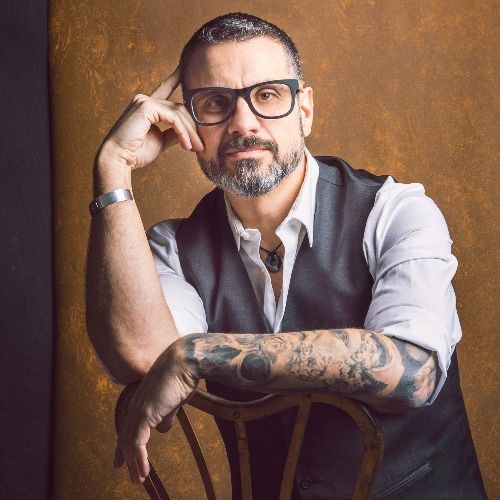Ep. 056: Are Photography Coaches Helping or Hustling?
You ever finish a photography course and think…
“That didn’t help at all”?
You’re not alone.
The coaching space is flooded right now—some of it’s gold, some of it’s garbage.
And when we’re unsure of ourselves, we’re more likely to buy the hype.
In this short episode I’m digging into the rise of photography coaches, why so many of us feel unfulfilled after taking courses, and how to become a better critical thinker—without burning out or giving up.
This isn’t about shaming educators.
It’s about empowering photographers to stop chasing quick fixes and start learning on their own terms.
Let’s talk about it.
Podcast Title: Generator
Episode Title: Are Photography Coaches Helping or Hustling?
Episode Number: 56
Publish Date: 12 July 2025
Calls to Action
- Website: https://generatorpodcast.com
- Subscribe to Generator: Never miss an episode – subscribe on your favorite podcast app.
- Leave a Review: Head over to https://podcasts.apple.com/us/podcast/generator/id1668192673 and leave us a 5 Star review if you liked the show! Help others discover this podcast.
- Follow on Social Media: Connect with us on Instagram or TikTok @generatorpodcast or on YouTube @stonetreecreative
Transcript
Does it ever feel like there are more photography coaches than actual photographers?
Speaker A:Now it seems like every time I open social media, someone's selling a new course or an ebook download or a strategy framework.
Speaker A:Master your pricing, find your niche, scale to six figures, and it's easy to start thinking, maybe this is what I need to finally break through.
Speaker A:But I think we need to pause and ask ourselves what's actually going on here?
Speaker A:Because the rise of photography coaching, it's not just a trend, it's a symptom.
Speaker A:And I want to talk about it.
Speaker A:Not to call anyone out, but to help all of us think a little bit more clearly before we spend another dollar chasing something shiny.
Speaker A:So why is photography coaching booming?
Speaker A:Part of it is access.
Speaker A:Social media gives us global reach.
Speaker A:Anyone with a camera and a canva account and access to AI can be a now.
Speaker A:But the other part, I think the actual business of photography is just getting harder AI tools and smartphones and cheap presets, things like that make it really easy for hobbyists to take solid photos, like really good photos.
Speaker A:And clients, well, they don't always know the difference between a pro and someone with a decent Instagram feed.
Speaker A:And it's up to us to educate them on the difference.
Speaker A:But a lot of times they're just looking for good enough, right?
Speaker A:So for a lot of working photographers like myself, coaching isn't a grift or a scam, it's survival.
Speaker A:The coaches are trying to supplement their income, diversify, share what they've learned through years of experience in the trenches.
Speaker A:And some of them are really, really good at it.
Speaker A:But there's a growing chunk of educators out there who aren't offering anything new at all.
Speaker A:They're just repackaging what they heard at a workshop or saw on someone else's feed.
Speaker A:They watched a couple of YouTube videos and fed the transcripts into AI and said, Give me a way to repackage this and sell this and optimize it for conversion.
Speaker A:They slap their own brand voice on it, maybe change the colors a little bit, and then resell us the same five talking points we've all heard for years.
Speaker A:But that's not mentorship, it's not education.
Speaker A:It's a game, a telephone.
Speaker A:The ideas get blurrier each time they're passed down, and the substance itself gets lost in the branding.
Speaker A:That's where coaching starts to feel like a popularity contest, not professional development.
Speaker A:In my first company, Firelance Media, I went all over the country filming, photographing and training with some of the top firearms professionals in the world.
Speaker A:These were people that had been there and done that and spent years mastering their craft because for their students it means life or death.
Speaker A:But then I saw a lot of other trainers pop up spitting out the same things that they had seen in a video or in the same class that I was in.
Speaker A:But they didn't have the context, just the concept.
Speaker A:And one without the other leads to incomplete education.
Speaker A:Those folks are easy to spot and even easier to dismiss.
Speaker A:And now I'm seeing the exact same thing in the photography industry.
Speaker A:And then there's the harder truth.
Speaker A:There are some folks selling courses on how to grow photography business that don't actually have one themselves.
Speaker A:They couldn't make it as photographers long term, so they pivoted to teaching others how to succeed at the thing they couldn't figure out.
Speaker A:And if you look really closely, the product isn't photography anymore.
Speaker A:It's the course itself.
Speaker A:So let me restate the point.
Speaker A:The problem is not that they're teaching.
Speaker A:The problem is they're selling an illusion.
Speaker A:It's a shortcut, an easy button.
Speaker A:And for creatives who are tired or burned out or insecure, that shortcut looks really, really tempting.
Speaker A:I can't tell you how many tens of thousands of dollars I spent over the years learning from incredible teachers.
Speaker A:And I've also spent thousands on courses that left me feeling like I totally wasted my money.
Speaker A:So why do we fall for it?
Speaker A:Honestly, it's because we're human.
Speaker A:And running a creative business is hard.
Speaker A:No one can ever really convey to you how hard it's going to be.
Speaker A:We always feel like we're behind.
Speaker A:We're often not confident in our pricing or our style or our customer service process.
Speaker A:And when someone shows up saying, I'm going to give you the answer, you want to believe them.
Speaker A:We're desperate.
Speaker A:And the hook that they get us with.
Speaker A:It's the fact that courses sell certainty.
Speaker A:And in a career full of uncertainty, that's a really powerful thing to sell.
Speaker A:But here's what most of us figure out too late.
Speaker A:Buying the course doesn't give you the confidence.
Speaker A:Doing the work does.
Speaker A:Again, don't get me wrong, there are great educators out there.
Speaker A:I know a bunch of them.
Speaker A:They've built the businesses.
Speaker A:They've walked the walk.
Speaker A:They don't over promise.
Speaker A:They are just giving you their point of view based on their journey.
Speaker A:And for some, it's easier to create a course than it is to answer the same question a thousand times.
Speaker A:Good educators teach you how to think, not just what to copy.
Speaker A:So how do you spot the real ones.
Speaker A:Look at how they talk.
Speaker A:Are they hyping you up or are they being honest?
Speaker A:Are they transparent about their failures?
Speaker A:Do they give away the value for free before asking for money?
Speaker A:The best teachers I know lead with generosity and clarity, not scarcity and hype.
Speaker A:And I want to be fair here, because not every new coach is a fraud.
Speaker A:Not by a long shot.
Speaker A:But I'm always skeptical of someone that started their business three years ago that's now selling coursework on how to run a successful business.
Speaker A:In my mind, how can you have gained enough experience in the craft to speak eloquently on the subject matter?
Speaker A:That said, some people are stepping into teaching because they do have something to say.
Speaker A:No, they're not polished.
Speaker A:They might not have a ton of experience, but they genuinely want to help.
Speaker A:They're showing up, they're figuring it out and sharing what they've learned so far.
Speaker A:There's nothing wrong with that.
Speaker A:Not everyone has to be a 10 year veteran to offer value.
Speaker A:We just need to be able to know the difference between someone sharing and someone selling.
Speaker A:At the end of the day, here's what I believe.
Speaker A:Coaching is not bad.
Speaker A:Courses are not the problem, but why we buy them.
Speaker A:That's where the real conversation is.
Speaker A:So we have to ask ourselves, do we want a shortcut or do we want tools that help us build something real?
Speaker A:If you know what you're looking for, a great educator can save you years of trial and error.
Speaker A:But if you're just looking for a magic answer without having figured out what it is that you really want, you'll always be disappointed and broke.
Speaker A:You don't need a guru.
Speaker A:You need a mirror.
Speaker A:You need a plan.
Speaker A:You need a little space to trust yourself again.
Speaker A:So here's the deal.
Speaker A:If you've been burned by a course or a coach before, you're not stupid.
Speaker A:You're not gullible.
Speaker A:You are hopeful.
Speaker A:And that's not a flaw.
Speaker A:That's being human.
Speaker A:But now you know better.
Speaker A:So next time you're about to hit buy now, just pause for a second.
Speaker A:Ask yourself, do I need this?
Speaker A:Or do I just want to feel better?
Speaker A:One's about growth, the other's about comfort.
Speaker A:And only one of them gets you where you really want to go.
Speaker A:Thanks for watching.
Speaker A:Keep creating.
Speaker A:And most importantly, just keep thinking.



